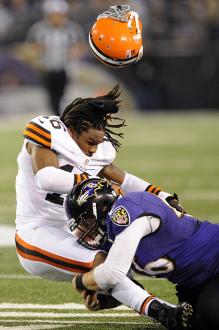The other day I posted a lengthy article from Esquire on the crisis mentality that has emerged in the NFL around head injuries and the violence of the game. There have been similar articles over the last week or two as everyone gears up for today's Super Bowl game between the San Francisco 49ers and the Baltimore Ravens, the first time ever that brothers have faced each other in the Big Game as opposing head coaches.
I have to admit a long-time love affair with football - I loved to play it when I was a wee lad (before soccer became my year-around sport) and I have loved watching it for as long as I can remember, all the way back to the first Pittsburgh Steelers Super Bowl win.
But I am also concerned about the increasing recognition of brain damage in these men, the public awareness of which grew substantially following the autopsy on Junior Seau that revealed repeated brain traumas that most likely led to his suicide. These men are bigger, stronger, and faster than ever, and the level violence created when bodies like theirs collide can be catastrophic both in the short term (concussions) and the long-term (brain damage).
Philosopher Alva Noë recognizes the dangers inherent in a sport that revolves around hitting the opposing player has hard and as fast as possible, often with the goal of dislodging the ball if at all possible. Still, he is watching the Big Game and he recommends you watch, as well.
For an opposing view, see Stop Ignoring Head Trauma: Turn Off The Super Bowl by Barbara J. King.
Poetry In Motion: Why I'll Be Watching The Super Bowl
by ALVA NOË
February 01, 2013
Randy Moss of the 49ers glides down the field, under an arcing football, on his way to a touchdown against the Patriots on December 16, 2012.Jared Wickerham/Getty Images
I don't blame professional footballers for suing the NFL for supposedly having failed adequately to protect them from head injury.
That's the way we do things in our society. We see a problem and start suing; it's our way of trying to figure out what changes need to be made and whose insurance companies are going to pay for them.
What I don't buy, not for a second, is that we didn't all already know that playing football, the way they play it in the NFL, is very dangerous. (Although we have surely learned a good deal about the far-reaching consequences of head injury! See this technical article; it was cited in Barbara King's provocative discussion here at 13.7 on Thursday.)
A great many sports are dangerous, to one degree or another.
Athletes get hurt. Badly. They're like gladiators. They get beat up, knocked around, and they live with pain. Surgery, to repair damage done and to extend a career, is normal.
They say taking steroids and other performance enhancing drugs is bad for your health. One reason to ban PEDs, it is said, is to protect athletes from these dangers.
That reasoning reminds me of a joke: a man stands before the firing squad; he is offered a last cigarette. "No thank you," he says. "I'm trying to quit."
If you want safety and good health, steroids are not the problem. It's sports themselves.
But my aim today is to praise sport, though, not to bury it.
I will be watching the Super Bowl this weekend. And I recommend it to you.
Forget the dangers. Forget the use of banned drugs. Forget the commercialism.
The value of sports — the value of spectator sports — outstrips all that.
Sports is a field of love.
We love sports. We love these athletes.
And we value being spectators because it gives us an opportunity to love and adore them.
We admire them, in the original sense of this word: we feel wonder in the face of all that these athletes accomplish. We are awed by their strength and speed, extraordinary skill, drive and determination, their fight.
But above all, we value the physical courage that enables these players to play to win. We applaud them for their willingness to leap and jump and twist and slam and take the hit.
I won't allow my boys to play tackle football in high school. That's not the life I want for them.
But I will be watching the Super Bowl this weekend to celebrate and adore these most unusually accomplished and beautiful people!
We may forget that poetry in Europe begins with the celebration of athletic achievment in theOdes of Pindar. The spectacle of sports carries on and it remains a fitting subject for celebration.
~ You can keep up with more of what Alva Noë is thinking on Facebook and on Twitter:@alvanoe


No comments:
Post a Comment